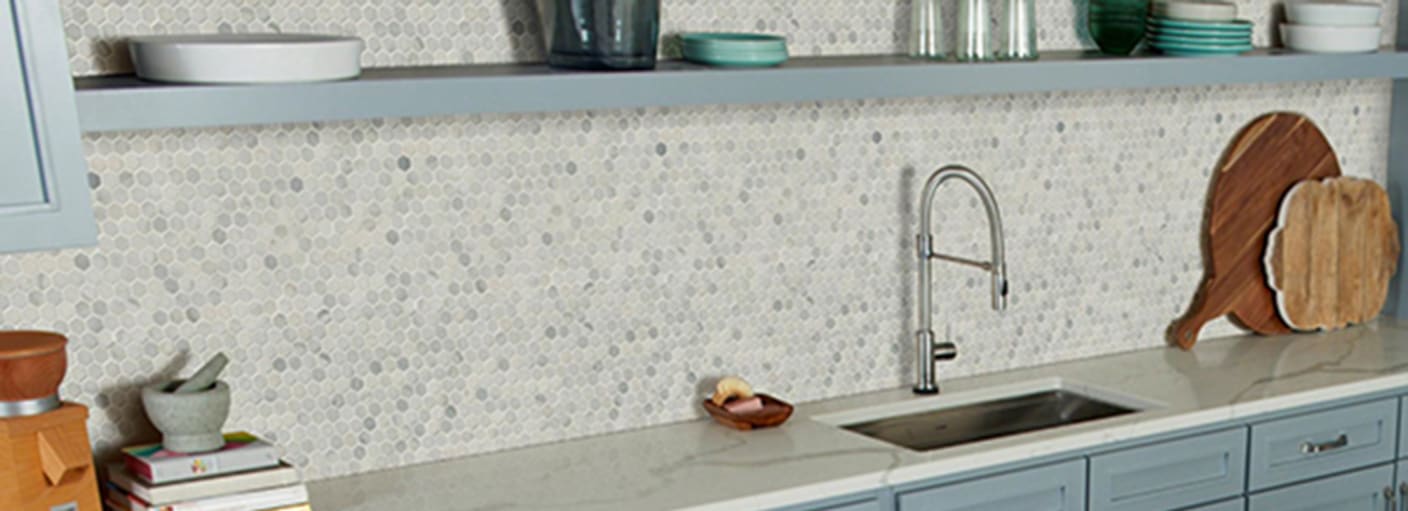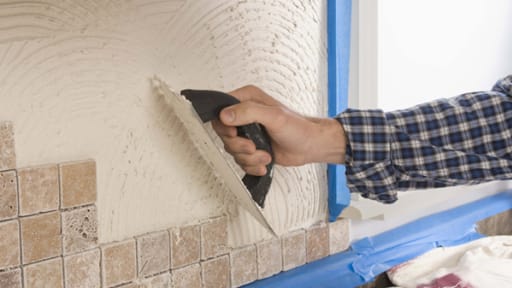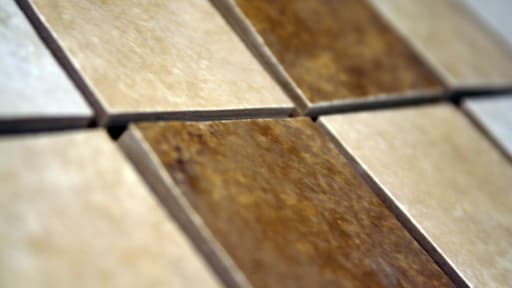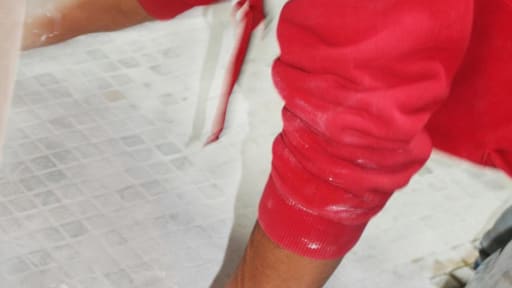Mortar, Grout & Thinset: What's The Difference?
Posted by Marilyn K. on 8th Jun 2023

Tuesday, September 12, 2017
Do you want a home improvement project that is almost certain to increase your home's value? Many realtors will tell you that you can hardly lose if you focus on your kitchen or bathroom. As part of a kitchen or bath remodel, you may want to replace your tired laminate with durable and elegant tile. Once you familiarize yourself with the supplies you’ll need, you might be able to complete your first DIY tile job on your day off.
What is the Difference Between Mortar, Thinset, and Grout?

Before you head off to buy supplies, make sure you understand the difference between mortar, thinset, and grout. These products may seem similar; however, it's important to understand the difference, so prepare and use them correctly.
The differences between grout, thinset, and mortar for tile projects:
- Mortar: Mortars are used to bind one surface to another. You might spread mortar on the foundation to get your tiles to stick to the floor and stay in place. Mortar contains lime, water, sand, and cement. Typically, mortar has a thick consistency to make it spreadable.
- Grout: Applying grout is one of the last steps of the process of tiling your floor. After you have given the mortar time to cure, use grout to fill the surfaces between the tiles. Grout may also contain cement, but it's much thinner to make it pourable. You can also find epoxy or resin grouts.
- Thinset: Very often, people refer to thinset as mortar, and it does serve the function of getting tile to stick to a surface. You might use thinset as your adhesive if you plan to tile a shower floor or use heavier materials. Thinset contains sand, water, and cement.

Before you head off to buy supplies, make sure you understand the difference between mortar, thinset, and grout. These products may seem similar; however, it's important to understand the difference, so prepare and use them correctly.
The differences between grout, thinset, and mortar for tile projects:
- Mortar: Mortars are used to bind one surface to another. You might spread mortar on the foundation to get your tiles to stick to the floor and stay in place. Mortar contains lime, water, sand, and cement. Typically, mortar has a thick consistency to make it spreadable.
- Grout: Applying grout is one of the last steps of the process of tiling your floor. After you have given the mortar time to cure, use grout to fill the surfaces between the tiles. Grout may also contain cement, but it's much thinner to make it pourable. You can also find epoxy or resin grouts.
- Thinset: Very often, people refer to thinset as mortar, and it does serve the function of getting tile to stick to a surface. You might use thinset as your adhesive if you plan to tile a shower floor or use heavier materials. Thinset contains sand, water, and cement.

You might decide to use mosaic tiles for your DIY project. Typically, these are small pieces of colored tiles that create a design or picture after they have been property installed. You might commonly use these kinds of tiles for backsplashes or other wall applications, but sometimes, people use them for flooring.
Do You Always Need to Grout?
When you buy commercially made tile, you might think that they are all exactly the same size. Since they appear so uniform, you could be tempted to simply install them edge to edge and skip the grout. Experienced tilers would never suggest this. Even if the tiles look exactly the same, you can bet that they aren't.
Even if they are off by a fraction of an inch, you'll have problems if you can't compensate by spacing some some slightly further apart and making up the difference with grout. If you don't, you will have some tiny spaces between the edges of your tiles anyway. You should ask yourself if you'd rather have grout or inevitable debris in those spaces.
Grouting isn't difficult, and it's the hallmark of a finished tile project. As a final step, you should apply grout sealer to any porous grouts. This keeps the grout from eventually absorbing dirt and moisture, so it's a critical step in any bathroom or kitchen remodel job.
How Long Does it Take to Tile a Floor?

If you're experienced and have all of your supplies on hand, you might be able to finish tiling a 100-square-foot bathroom in half a day. If you have never done this sort of DIY project before, you should probably allow yourself an entire day. Even so, you can save a lot of money by doing the job yourself, and you'll enjoy the value of a beautiful and durable tile floor for years in the future.

If you're experienced and have all of your supplies on hand, you might be able to finish tiling a 100-square-foot bathroom in half a day. If you have never done this sort of DIY project before, you should probably allow yourself an entire day. Even so, you can save a lot of money by doing the job yourself, and you'll enjoy the value of a beautiful and durable tile floor for years in the future.
About the Author
Marilyn K. writes blog posts, articles, social media content, white papers, and eBooks. She enjoys variety and welcomes requests for other kinds of content. She most commonly writes in these industries: health, finance, insurance, business, digital marketing, the internet, real estate, and web and software development.
The articles and other content contained on this website/blog are provided for informational purposes only and should not be relied upon for any purposes. While it is our goal to provide you with up-to-date, relevant and useful information on a wide range of topics, we make no representations or warranties of any kind, whether express or implied, concerning the reliability, suitability, completeness or accuracy of any of the information made available on this site. The articles and information contained on this site are not intended to provide legal, accounting or other professional or business advice and should not be treated as a substitute for the advice of a professional with knowledge of the facts and circumstances of your specific situation. By accessing this site, you agree that you will not seek to hold E.C. Barton & Company or any of its affiliates liable for any losses or unanticipated costs or assert any other claim based on your use of this site or on the reliance on the content contained herein.


